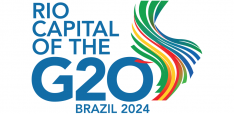Global Shocks and the U.S. 2020 General Elections Call for Wild Card Analysis

This past year has shown many governments that they are not as resilient as they thought they were when facing global shocks. COVID-19 has especially exposed the fragility of our interconnected world, begging the following questions: How do we even begin to anticipate the next global shock? More importantly, how do we make ourselves more resilient to them?
The moment a global shock occurs, it is referred to, in the field of strategic foresight, as a “wild card”. Wild cards are a single event or development that have a low probability of occurring but when they do, they do so with high impact and speed. In a speech to members of the National Institutes of Health in 2014, US President Obama warned, “there may and likely will come a time in which we have both an airborne disease that is deadly...” Despite repeated warnings, a pandemic was treated as a remote possibility. The impact of a wild card is such that it changes the entirety of our concept of the ordinary world. COVID-19 started out localized and rapidly developed into a global pandemic that led to massive economic and social lock-downs - completely altering much of what we once considered to be fundamental to our day to day life. These subsequent developments, or after-shocks, left much of the world governmental and organization policy leaders in the dark about how to respond. By the time policy decisions were made, it came too little, too late.
More than ever, there are clear and urgent reasons for thinking ahead, as the consequences for not accounting for wild cards is to lose the chance for preventative action, contingency planning and effective crisis management. Therefore, wild card scenario analysis plays a crucial role in preparing strategic options when we are forced to create new trajectories after they occur.
The US General Elections in November presents another opportunity for things to go awry. Much is at stake; from meaningful global action on climate and the endurance of effective multilateralism to the normative idea of democracy. Consequently, I collected wild cards systematically by taking the timeline and process of the election and marking our assumptions of them. For the US election, this included a time horizon of several weeks before the election and the inauguration of the president. They all represent challenges to our assumptions about the upcoming US elections.
In this policy brief, five wild cards scenarios are presented that represent enormous challenges and opportunities for the US and the global arena altogether, in effort to have readers form their own judgements about how to act proactively or build resilience where it may be needed.
Wild Card Scenarios for the US General Election
Wild Card One: Democrats flip White House and Senate
In the last days before the election, Biden is able to present a compelling narrative about his plans to return the US to normalcy. A scared and exhausted public turned out in droves to vote any way they can. On election day, Biden has the lead in the popular vote. After counting the mail-in voting, it is clear that not only did the Democrats win the presidential election, the party managed to take the Senate too. Foreign interference didn’t have quite the influence it did in the last presidential election. Legal battles still ensue over state results that were close. Trump and his team contest the election on the basis of election fraud by Democrats but it doesn’t get the momentum from right-wing media or within Republican elites needed. Trump isn't inclined to leave the White House. Biden doesn’t lean into forcibly moving Trump out, rather focusing on the message that he can lead the nation from anywhere. The day before inauguration family members tell him to vacate the White House, which he eventually does, stating something along the lines of starting his own media company. Following Biden’s inauguration, it is quickly clear the US intends to return to multilateralism. Plans to rejoin the major international agreements are immediate objectives, however, other international objectives have to take a backseat until the US can regain its own domestic strength in order to then rehabilitate America’s global standing.
Wild Card 2: Constitutional crisis over who picks the president
On election day, Biden has taken a substantial lead in the popular vote. Only three states remain contested - Wisconsin, Michigan and Pennsylvania leaving 46 electoral votes unclear. Counting ballots only begin on election day. In the days following the election Trump holds a slim lead in Wisconsin and Michigan (enough to secure the win). The ballot counting centers struggle with delays due to COVID-19 rules and understaffing. Before results are in, Trump declares himself as victor; with Fox media friends and his base amplifying his claims. Biden and his campaign team refuse to concede. Several days before the Electoral College is to vote Biden has taken the lead and is set to become the next US president. However, the Democrats didn’t secure enough seats to secure the majority in the Senate. Trump and his team claim Trump actually won and the ‘radical and corrupt’ Democrats and foreign influencers had altered the outcome. Biden and other Democrats refute these claims. The Electoral College votes. After voting, normally each state governor is to certify the elections results and send them onto Congress. All three states have a Democrat as a governor. They certify results with Biden as the winner and send the certificates onto Congress. In response, Trump asks state legislators to exercise their power to choose a slate of electors directly. In all three swing states Republicans control both branches of the legislature and they too send certificates onto Congress. Congress debates the constitutionality of the arrival of two certificates. The seemingly only legal way out of this mess is the Electoral Count Act of 1887 which seems to favor the governors of the states. The Senate counters this by stating that they could ignore the state governors certificates, on the basis of election fraud conducted by the Democrats. The President of the Senate, Mike Pence, opens the certificates and counts the votes as he is given the right in the 12th Amendment. He reads out the states legislatures’ certificates, instead of the states’, thus revealing the victor to be President is Donald J. Trump.
Wild Card 3: American public descends into civil war
On election day news breaks of higher military ups and secret service members having discussed their role in the transition of Biden entering the White House in January, should it become necessary. Troll farms and conspiracy networks create a common narrative of a planned coup by the ‘corrupt and radical left’. Media outlets broadcast these theories and they reach even wider audiences. On election day the numbers are in Trump’s favor but days later it is Biden who has taken the lead. Additionally, the Democrats will take the majority in the Senate too. Trump still declares himself as the true victor and vows to stop the Democrats from stealing the election. Fox media and his base amplified his claims. Legal battles ensue. Online narratives encourage Trump supporters to take up arms and secure ballot counting locations and government buildings. Paramilitary groups emerge and counter protesters meet them in violent clashes. Trump makes approving statements regarding the paramilitary members and argues that the violence and legal battles are a part of Biden and the Democrat’s ‘coup’. When the results of the Electoral College reveal that Biden has won the presidency protests become widespread and deadly. Come inauguration day, Biden is forced to call in the military to remove Trump from the White House and to deal with widespread deadly clashes between Americans.
Wild Card 4: Iran and Democrats collude to steal the election
Trump and his team are desperately looking for ways in order to save his run for re-election. Trump makes an official announcement days before the election that an attack from Iran is imminent. Iran has already been caught trying to divide the country ahead of the election by spreading disinformation and anti-US content online. Additionally Iran plans to use sleeper agents to attack people at known conservative area polling locations and ballot counting locations. Trump and his team state that they believe that Biden has colluded with Iran to win the presidency, on the grounds that Trump in his second term would not back down from continuing to apply pressure on Iran and there is no way Biden would win the election legitimately. While Trump cannot cancel or postpone the election, he declares that swift and immediate responses will be taken and it is now evident that if the Democrats win, it is because of fraud. Biden and Democrats outright reject this linkage between themselves and Iran but the consequences are already far reaching.
Wild Card 5: Lasting effects of COVID-19 deplet Trump’s mental stability
One month before the election President Trump tests positive with COVID-19. He is soon flown to a hospital and is treated with experimental drugs and antiviral medication. While Trump states he has only a mild cough and headache, the symptoms are actually stronger than led on. Rather than symptoms going away with time they wax and wane without ever going away. Trump begins to make erratic decisions like leaving the hospital care to go for a car ride and moving forward with public appearances. Half of the Trump administration has also tested positive for COVID-19 and there is little to no one who is around enough to stand up to Trump about his decisions moving forward. By election day Trump has not had a normal body temperature since testing positive and deals with fatigue, a racing heartbeat and foggy thinking on a daily basis. In the week following the election is clear that Trump is the winner. However, his medical staff begin to voice their concerns about his ability to function as president. Trump states that their vocalization of concern is concerted effort by the Democrats to make him seem unfit for a second term. Calls to invoke powers in Section 4, Amendment 25 are made within Congress to Trump’s cabinet. He becomes increasingly anxious and paranoid. His tweets become less empty and paranoia takes the shape of retaliatory policies domestically and abroad.
Mitigate effects, build resilience with wild card analysis
The wild card scenarios developed here do not represent what will come to be. Rather they point directly or indirectly to the existence, characteristics of signals and trends that if they coalesce at the right moment could bring us the next global shock before the year is over.
If 2020 has shown us anything, just because something has a low probability of occurring doesn’t mean no probability of happening nor is it slow. The year has shown us that waiting around until concrete evidence delivers certainty about what to do, means government or organizational action often comes too little, too late. Scenario planning with wild card analyses offer imaginative narratives about the future that give its creators or readers the chance for early action, particularly when faced with potentially catastrophic crises that no longer affect isolated parts of the world.
Incorporating wild card analysis into strategic planning is justified on the basis of being prepared for and acting on the worst case scenario. Overall scenario analysis is a powerful tool that helps to break-down traditional groupthink tendencies, challenge our assumptions about current strategies and develop a possible range of contingency plans that better reflect an ever-changing environment. Furthermore, placing the potential of wild cards in terms of threats to the global system can be used to renew calls to multilateralism through the development of united early warning systems and contingency planning.
Resilience to the global shocks, whether it is technology, environmental or politically driven, is likely to become a defining focus of strategy in the years to come. Building resilience now can mitigate the effects of wild cards and present unique opportunities later on. In many cases, governments and organizations shy away from taking wild cards seriously as the potential cost for needed change seem too high for an event that is uncertain of occurring. They will have to find a way to compromise. The primary lesson of the pandemic still stands: wild cards that present complex, systemic challenges and even the reevaluation of our norms often come at higher price and therefore cannot be ignored.
Jessica is the Executive Assistant at Foresight Intelligence. While being responsible for providing comprehensive support to the consultants there, she is advancing her own expertise in foresight techniques with a special focus on wild card scenario planning. Prior to that she worked with the International Peace Bureau as a coordinator and researcher and was a planner and editor at the Deutsche Presse-Agentur. She received her MA in International Relations at Bremen Universität and Jacobs University with research interests including foresight, societal contestation, security politics, private security companies and risk discourse.
The opinions expressed in this article are those of the author. They do not reflect the opinions or views of Foresight Intelligence. Special thanks to Dr. Johannes Gabriel at Foresight Intelligence and Joel Sandhu at Global Public Policy Institute for their many contributions and support.
Photo by Akshay Anand from Pexels


